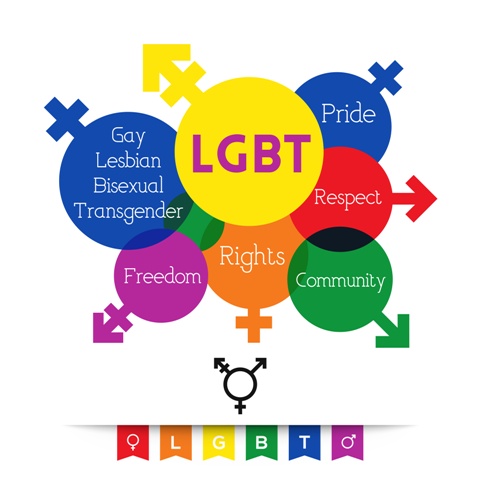Speaking the Unspeakable in forbidden places: addressing lesbian, gay, bisexual, and transgender, equality, in primary school
 Whenever
we think of schools, what first came to our head is, “...place of safety and
innocence; a place where children is both natured and sheltered…” (Alexandra Allan). When the school
becomes this secure, sexuality becomes monitored and prohibited, where students
aren’t able to express themselves. I remember there was a gay student in high
school, and other students dislike the fact that he was gay and they fought
him. The teachers did break the fight but did not help prevent any bullying
upon students who were gay or has sexuality difference. They did not hold any assembly
to talk about sexuality or bullying. This alleged that sexuality probably was
prohibited in that school or as Alexandra Allan and the rest of the authors has
stated, “...identities are made absent in one sense through the fact that they
are not addressed in formal school contexts...”
Whenever
we think of schools, what first came to our head is, “...place of safety and
innocence; a place where children is both natured and sheltered…” (Alexandra Allan). When the school
becomes this secure, sexuality becomes monitored and prohibited, where students
aren’t able to express themselves. I remember there was a gay student in high
school, and other students dislike the fact that he was gay and they fought
him. The teachers did break the fight but did not help prevent any bullying
upon students who were gay or has sexuality difference. They did not hold any assembly
to talk about sexuality or bullying. This alleged that sexuality probably was
prohibited in that school or as Alexandra Allan and the rest of the authors has
stated, “...identities are made absent in one sense through the fact that they
are not addressed in formal school contexts...”
I
like how this article uses a fairytale to help introduce sexuality identities to
children. The experiment was successful, and the children did understand that
even princes or princesses don’t have to marry a prince or a princess. With the
quote, “...he has to meet all these princesses but doesn't want to marry any of
them...” (Alexandra Allan) it makes me think twice on what the
prince really wants. Some of the questions that came up when I was reading
about Cindy’s experiment are what if the prince is gay? Or the princess is
lesbian? Is it alright? According to Cindy, it is OK that princes and
princesses have a different sexual identity. Not everyone have an identical
identity. I agree with Allan’s
statement, “...teachers should take responsibility for helping pupils to
recognize sexuality and thereby work towards greater social justice” (Alexandra
Allan).
The
problem of sexuality that people had while growing up in heterosexuality society
is trying to fit in. Due to confusion, and anxiety, kids would feel different.
Do to their differences, kids were bullied and ignored by most teachers and the
school’s staffs. I believed that a child growing up with identity difference,
being bullied and ignored can cause them to become corrupted in the future.
More likely, I believed that some even commits suicide and it’s what all adults
should help prevent.
On
the other hand, I dislike how sets of books on sexuality were “unpacked on
staffroom tables [in schools] and left for teachers to browse at their leisure” (Alexandra
Allan).
Children should be introduce to sexuality as soon as possible so, as they grow
up, they should have a clear understanding of identity difference that would
help prevent future chaos and decrease bullying. Relating to “Privilege, Power
and Difference” by Allan G. Johnson, the teacher are the ones who have power
over the children while the principles having the power over the teachers. In
this case, it was the principles’ duty to enforce the learning of “LGBT”
(lesbian, gay, bisexual, transgender) and the uses of LGBT books. But I don’t
blame them because it wasn’t their fault that their society is probably made up
of heterosexual people or the principle grew up knowing heterosexual
themselves.
A
question that pop up in my head are: what would you do if you were told by the
school board to teach a few class about LGBT in your school and knowing that
as the principle, most of your children comes from heterosexual background and
most of their parents already made voices notifying not to teach of LGBT in
school?
Bibliography
Alexandra Allan, Elizabeth Atkinson, Elizabeth Brace,
Renee Deplama. "Sex Education." Speaking the Unspeakable in
forbidden places:addressing lesbian, gay, bisexual, and transgender, equality,
in primary school August 2008: 315-328.
Johnson, Allan G. "Privilege, Power, and
Difference." 2001: VII-35.

I loved the video you added, I would've never known about these shelters holding a good amount of identified LGBT's. It is so heartbreaking.
ReplyDeleteI also thought it was a good idea to use Cinderella to introduce this topic to the children. The video was eye-opening as well.
ReplyDeleteI couldn't agree more with you about the books! It is such a shame that the teachers are fighting against the project in their own ways too!
ReplyDeleteI couldn't agree more with you about the books! It is such a shame that the teachers are fighting against the project in their own ways too!
ReplyDeleteHey Yer, I mentioned you in my blog. Interesting points you have on here and I love the pictures.
ReplyDelete